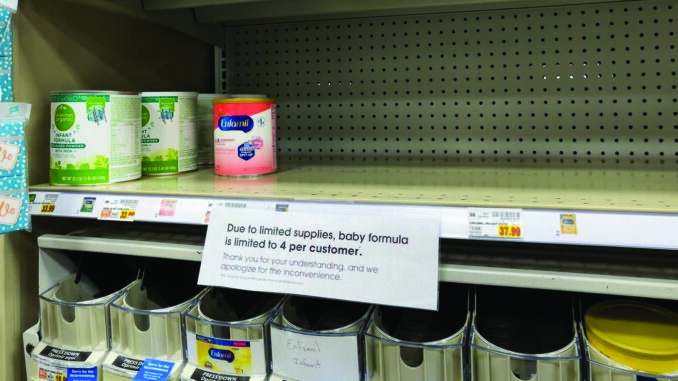
By Roz Edward
(Source The New Pittsburgh Couries):
The worsening baby formula shortage is forcing millions of parents across the nation to drastic measures to meet the nutritional needs of infant children. Their exhaustive searches for baby formula have caused a number of reactions from traveling long distances to find formula to watering down formula in an attempt to stretch it.
Some parents have admitted trying to make their own DIY formulas, while others confess that they continue to use the recalled powdered formula to feed infants. “I’d rather feed her and take the chance that she’ll get sick, or not feed her and assure that she will get sick,” said California mom.
Reasons for the shortage can be narrowed to two primary causes: the national supply chain shortage that decreased product accessibility and increased food costs for millions of U.S. households, coupled with a federal recall of contaminated formula.
Since November knotted supply chains have made it difficult for parents to locate baby formula and in February the U.S. Food and Drug Administration shut-down Michigan-based Abbott Laboratories — a major player in the formula business — and recalled three of their powdered baby formula brands; Similac, Alimentum, and EleCare due to potential bacterial contamination.
The growing crisis for families feeding infants and children reached dramatically high discrepancy rates in May with retailers reporting a 43 percent out of stock rate.
On Sunday, May 15, U.S. House of Representatives Speaker Nancy Pelosi announced that the congress is considering legislation to alleviate the baby formula crisis and fix issues connected to how people can purchase formula.
The proposed legislation would “loosen some of the red tape,” she said, pointing out that half of the formula is bought by WIC recipients.
WIC users are particularly vulnerable as they represent the bulk of mothers and children at risk. The federal WIC program, which stands for Special Supplemental Nutrition Program for Women, Infants, and Children, provides grants to states to support low-income postpartum and pregnant women, as well as infants and children who face nutritional risks.
FDA Commissioner Robert Califf said the agency is taking measures to get infant formula supply back to 100 percent over the next several weeks to months, adding it was “quite likely” there could be movement to reopen Abbott Laboratories’ Sturgis, Michigan, manufacturing facility in about two weeks.
But Dr. Scott Gottlieb, the former head of the Food and Drug Administration, said “known problems” at the baby formula plant in Michigan “should have prompted more aggressive action earlier.”


Be the first to comment